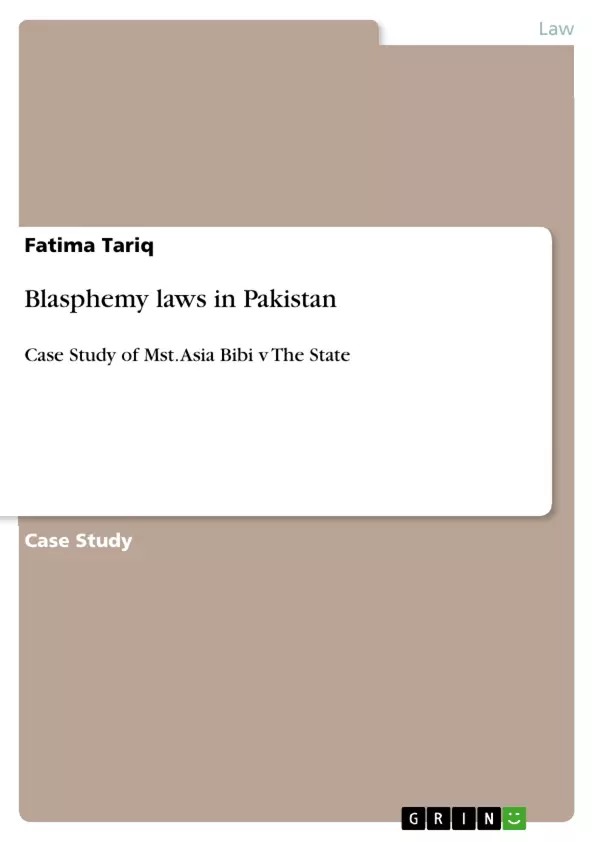The point of discussion of this paper is to have a detailed overview of blasphemy laws under the “Pakistan Penal Code”. This paper will begin by discussing what blasphemy is, then it will discuss the blasphemy laws in Pakistan with the historical background. It will explain the landmark blasphemy case: Mst. Asia Bibi v The State. The critical review of the Asia Bibi Case will be given in this paper at hand. This paper will briefly discuss the flaws in section 295C and how it is causing injustices in society and further discusses how it is misused against minorities and discriminate against people on the basis of their religion. Furthermore, it will be discussed how blasphemy laws are causing serious threats to society perhaps destroying the religious harmony in the society. In addition to that this paper will also discuss these laws in the light of Islam. In the end, it’ll give some recommendations to make this law compatible with society. The whole paper is supported by case laws.
Inhaltsverzeichnis (Table of Contents)
- Part I: INTRODUCTION
- WHAT IS BLASPHEMY?
- BLASPHEMY LAWS
- HISTORICAL OVERVIEW
- SECTION 295-B & 295-C
- Part II: CASE STUDY
- Mst. Asia Bibi v The State
- FACTS AND JUDGMENT
- CRITICAL ANALYSIS
- PRESUMPTION OF INNOCENCE
Zielsetzung und Themenschwerpunkte (Objectives and Key Themes)
This paper examines the history and application of blasphemy laws in Pakistan, particularly focusing on the case of Asia Bibi, a Christian woman convicted of blasphemy and sentenced to death. It explores the legal framework surrounding blasphemy, analyzes the impact of the laws on minorities, and critically assesses the principles of justice and due process within the context of blasphemy cases.
- The historical development of blasphemy laws in Pakistan
- The impact of blasphemy laws on freedom of speech and expression
- The role of religion and law in the Pakistani legal system
- The challenges of ensuring justice and fairness in blasphemy cases
- The complexities of applying legal principles to sensitive religious issues
Zusammenfassung der Kapitel (Chapter Summaries)
- Part I: INTRODUCTION
- WHAT IS BLASPHEMY?: Defines blasphemy and explores its religious and societal implications.
- BLASPHEMY LAWS: Provides a general overview of blasphemy laws around the world and their purpose.
- HISTORICAL OVERVIEW: Traces the origins of blasphemy laws in Pakistan, highlighting the introduction of specific laws during Zia ul Haq's era.
- SECTION 295-B & 295-C: Examines the specific sections of the Pakistan Penal Code relating to blasphemy, emphasizing the harsh penalties associated with them.
- Part II: CASE STUDY
- Mst. Asia Bibi v The State: Presents the facts and judgement of Asia Bibi's case, outlining the accusations, trial proceedings, and final verdict.
- FACTS AND JUDGMENT: Provides detailed information about the allegations against Asia Bibi and the legal proceedings that led to her conviction and subsequent acquittal.
- CRITICAL ANALYSIS: Analyzes the court's reasoning behind the acquittal, focusing on the role of evidence, legal interpretation, and the broader social context.
- PRESUMPTION OF INNOCENCE: Discusses the principle of presumption of innocence in law and its application in blasphemy cases, particularly highlighting the importance of evidence-based decision-making.
Schlüsselwörter (Keywords)
Blasphemy, Pakistan, Islam, Freedom of Speech, Religion, Law, Justice, Due Process, Minority Rights, Asia Bibi, Case Study, Critical Analysis, Presumption of Innocence, Legal Framework, Human Rights, Penal Code, Court, Verdict, Social Context.
Frequently Asked Questions
What are the blasphemy laws in Pakistan?
They are laws under the Pakistan Penal Code (especially sections 295-B and 295-C) that criminalize insults against Islam, the Quran, and the Prophet Muhammad, sometimes carrying the death penalty.
Who is Asia Bibi?
Asia Bibi is a Christian woman who became a global symbol after being sentenced to death for blasphemy in Pakistan; she was later acquitted by the Supreme Court.
What are the criticisms of Section 295-C?
Critics argue it is often misused to settle personal vendettas, lacks procedural safeguards, and disproportionately targets religious minorities.
How do these laws affect religious harmony?
The paper discusses how blasphemy laws can cause serious threats to society by destroying religious harmony and encouraging discrimination.
What is the "Presumption of Innocence" in these cases?
It is a fundamental legal principle that is often challenged in sensitive blasphemy trials, where social pressure can overshadow evidence-based decision-making.
- Citar trabajo
- Fatima Tariq (Autor), 2019, Blasphemy laws in Pakistan, Múnich, GRIN Verlag, https://www.grin.com/document/512540



